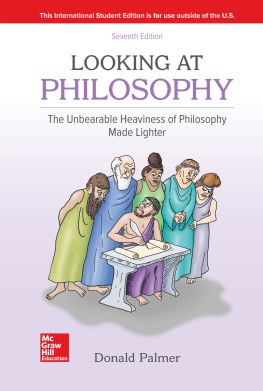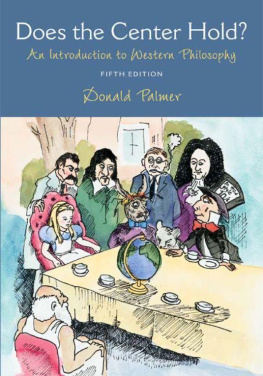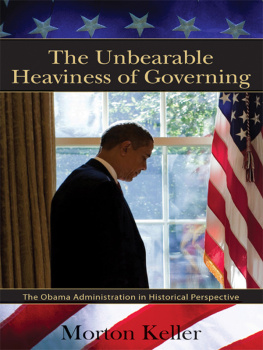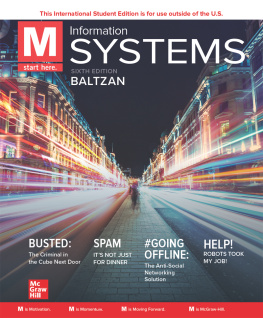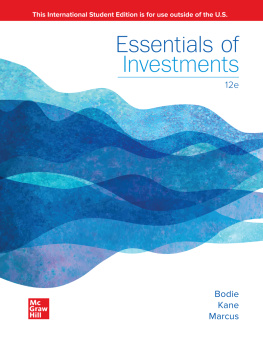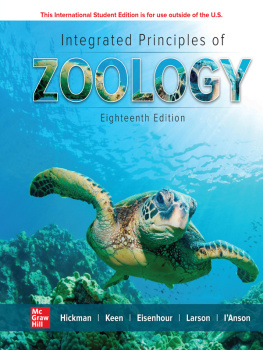PALMER - ISE EBook Online Access for Looking At Philosophy: The Unbearable Heaviness of Philosophy Made Lighter
Here you can read online PALMER - ISE EBook Online Access for Looking At Philosophy: The Unbearable Heaviness of Philosophy Made Lighter full text of the book (entire story) in english for free. Download pdf and epub, get meaning, cover and reviews about this ebook. publisher: McGraw-Hill Education (UK) Limited (ISE), genre: Religion. Description of the work, (preface) as well as reviews are available. Best literature library LitArk.com created for fans of good reading and offers a wide selection of genres:
Romance novel
Science fiction
Adventure
Detective
Science
History
Home and family
Prose
Art
Politics
Computer
Non-fiction
Religion
Business
Children
Humor
Choose a favorite category and find really read worthwhile books. Enjoy immersion in the world of imagination, feel the emotions of the characters or learn something new for yourself, make an fascinating discovery.
ISE EBook Online Access for Looking At Philosophy: The Unbearable Heaviness of Philosophy Made Lighter: summary, description and annotation
We offer to read an annotation, description, summary or preface (depends on what the author of the book "ISE EBook Online Access for Looking At Philosophy: The Unbearable Heaviness of Philosophy Made Lighter" wrote himself). If you haven't found the necessary information about the book — write in the comments, we will try to find it.
PALMER: author's other books
Who wrote ISE EBook Online Access for Looking At Philosophy: The Unbearable Heaviness of Philosophy Made Lighter? Find out the surname, the name of the author of the book and a list of all author's works by series.
ISE EBook Online Access for Looking At Philosophy: The Unbearable Heaviness of Philosophy Made Lighter — read online for free the complete book (whole text) full work
Below is the text of the book, divided by pages. System saving the place of the last page read, allows you to conveniently read the book "ISE EBook Online Access for Looking At Philosophy: The Unbearable Heaviness of Philosophy Made Lighter" online for free, without having to search again every time where you left off. Put a bookmark, and you can go to the page where you finished reading at any time.
Font size:
Interval:
Bookmark:

The Unbearable Heaviness of Philosophy Made Lighter
SEVENTH EDITION
Donald Palmer
Professor Emeritus at College of Marin (Formerly Visiting Assistant Professor, North Carolina State University)


LOOKING AT PHILOSOPHY
Published by McGraw-Hill Education, 2 Penn Plaza, New York, NY 10121. Copyright 2020 by McGraw-Hill Education. All rights reserved. Printed in the United States of America. No part of this publication may be reproduced or distributed in any form or by any means, or stored in a database or retrieval system, without the prior written consent of McGraw-Hill Education, including, but not limited to, in any network or other electronic storage or transmission, or broadcast for distance learning.
Some ancillaries, including electronic and print components, may not be available to customers outside the United States.
This book is printed on acid-free paper.
1 2 3 4 5 6 7 8 9 LCR 21 20 19
ISBN 978-1-260-56615-4
MHID 1-260-56615-3
Cover Image: Courtesy of Donald Palmer
All credits appearing on page or at the end of the book are considered to be an extension of the copyright page.
The Internet addresses listed in the text were accurate at the time of publication. The inclusion of a website does not indicate an endorsement by the authors or McGraw-Hill Education, and McGraw-Hill Education does not guarantee the accuracy of the information presented at these sites.
mheducation.com/highered
Wittgenstein once said that a whole philosophy book could be written consisting of nothing but jokes. This is not that book, nor does this book treat the history of philosophy as a joke. This book takes philosophy seriously but not gravely. As the subtitle indicates, the goal of the book is to lighten the load a bit. How to do this without simply throwing the cargo overboard? First, by presenting an overview of Western philosophy from the sixth century B.C.E. into the early twenty-first century in a way that introduces the central philosophical ideas of the West and their evolution in a concise, readable format without trivializing them, but at the same time, without pretending to have exhausted them or to have plumbed their depths. Second, following a time-honored medieval tradition, by illuminating the margins of the text. Some of these illuminations, namely those that attempt to schematize difficult ideas, I hope will be literally illuminating. Most of them, however, are simply attempts in a lighter vein to interrupt the natural propensity of the philosophers to succumb to the pull of gravity. (Nietzsche said that only the grave lay in that direction.) But even these philosophical jokes, I hope, have a pedagogical function. They should serve to help the reader retain the ideas that are thereby gently mocked. Thirty years of teaching the subject, which I loveand which has provoked more than a few laughs on the part of my studentsconvinces me that this technique should work. I do not claim to have achieved Nietzsches joyful wisdom, but I agree with him that there is such a thing and that we should strive for it.
Before turning you over to Thales and his metaphysical water (the first truly heavy water), I want to say a word about the women and their absence. Why are there so few women in a book of this nature? There are a number of possible explanations, including these:
Women really are deficient in the capacity for sublimation and hence are incapable of participating in higher culture (as Schopenhauer and Freud suggested).
Women have in fact contributed greatly to the history of philosophy, but their contributions have been denied or suppressed by the chauvinistic male writers of the histories of philosophy.
Women have been (intentionally or unintentionally) systematically eliminated from the history of philosophy by political, social, religious, and psychological manipulations of power by a deeply entrenched, jealous, and fearful patriarchy.
I am certain that the first thesis does not merit our serious attention. I think there is some truth to the second thesis, and I may be partially guilty of suppressing that truth. For example, the names of at least seventy women philosophers in the late classical period alone have been recorded, foremost of which are Aspasia, Diotima, Aret, and Hypatia. (Hypatia has been belatedly honored by having a journal of feminist philosophy named after her.) Jumping over centuries to our own age, we find a number of well-known women contributing to the history of philosophy in the first half of the twentieth century, including Simone de Beauvoir, Susanne Langer, and L. Susan Stebbing.
However, no matter how original, deep, and thought-provoking were the ideas of these philosophers, I believe that, for a number of reasons (those reasons given in the second and third theses are probably most pertinent here), few of them have been treated by historians of thought with as much attention as have their male counterparts. Fortunately, things have begun to change in the past few years. An adequate account of contemporary philosophy could not in iv good faith ignore the major contributions to the analytic tradition of philosophers Iris Murdoch, Philippa Foot, G. E. M. Anscombe, and Judith Jarvis Thompson, nor those contributions to the Continental tradition made by Gayatri Chakravorty Spivak, Monique Wittig, Luce Irigaray, and Julia Kristeva. Furthermore, a new wave of women philosophers is already beginning to have considerable impact on the content of contemporary philosophy and not merely on its style.
So, despite the risks, I defend the third thesis. I truly believe that if women had not been systematically excluded from major participation in the history of philosophy, that history would be even richer, deeper, more compassionate, and more interesting (not to mention more joyful) than it already is. It is not for nothing that the book ends with a discussion of the work of a contemporary woman philosopher and with a question posed to philosophy herself, Quo vadis?Whither goest thou?
In this, the seventh edition, I have made a number of changes from the former editions. Where readers have pointed out ambiguity or lack of clarity, I have changed the wording or rewritten whole paragraphs. In , I have added a section on John Lockes theory of personhood, which has become a topic of philosophical interest in recent years. I have updated some illustrations, deleted a few that no longer seem timely, and I have added some new ones. I have had some help with all seven editions of this book. Id like to thank the reviewers who made suggestions for the seventh edition. They include
Daniel Korman, University of California, Santa Barbara
Nathaniel Nicol, Washington State University
Jonathan Weinberg, University of Arizona
Paul Wilson, Texas State University
Jim Bull, my editor at Mayfield Publishing Company for the first two editions, had faith in this project from its inception. For the new edition, my development editor, Katy Gabel, and the project manager, Maria McGreal, at McGraw-Hill have been exceptionally helpful. My wife, Leila May, has been my most acute critic and my greatest source v of inspiration. She kept me laughing during the dreariest stages of the production of the manuscript, often finding on its pages jokes that werent meant to be there. I hope she managed to catch most of them. There probably are still a few pages that are funnier than I intended them to be.
Next pageFont size:
Interval:
Bookmark:
Similar books «ISE EBook Online Access for Looking At Philosophy: The Unbearable Heaviness of Philosophy Made Lighter»
Look at similar books to ISE EBook Online Access for Looking At Philosophy: The Unbearable Heaviness of Philosophy Made Lighter. We have selected literature similar in name and meaning in the hope of providing readers with more options to find new, interesting, not yet read works.
Discussion, reviews of the book ISE EBook Online Access for Looking At Philosophy: The Unbearable Heaviness of Philosophy Made Lighter and just readers' own opinions. Leave your comments, write what you think about the work, its meaning or the main characters. Specify what exactly you liked and what you didn't like, and why you think so.

